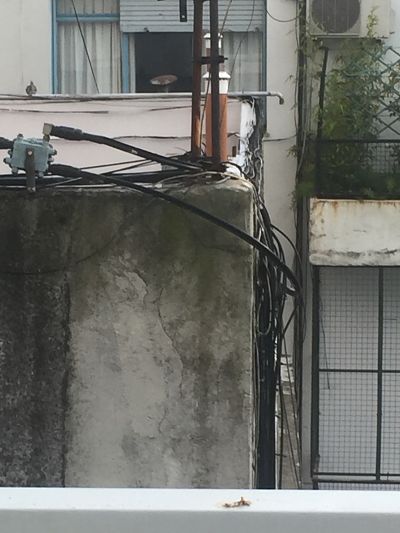One of the pleasures and also the problems of travel to another country is that each simple transaction is slightly mystifying: the language, the currency, the customs. Your habits are left at home with the clothes in your closet, and everything is fresh and surprising.
As one small, graphic example, the electrical apparatus of Buenos Aires is alarmingly slapdash.


Wires hang in clumps along the main boulevards, and in tangles behind the apartment buildings.
It has a certain charm, but also makes one wonder what the next big storm will bring.
In the same way, being in a new environment without the protection of your accustomed routine has a certain liberating effect but can also be profoundly disconcerting. It usually leads to at least one day where everything goes wrong.
We had one of those days when we left Buenos Aires–Larry discovered he had lost his bankcard, I grabbed wrong bag at the airport, and we spent the rest of the day unravelling these problems mostly in Spanish with phone systems that would not cooperate.
But these minor pains were salved by reading Borges’ lecture on his blindness which includes this paragraph, translated eloquently by Eliot Weinberger:
“A writer, or any man, must believe that whatever happens to him is an instrument; everything has been given for an end. This is even stronger in the case of the artist. Everything that happens, including humiliations, embarrassments, misfortunes, all has been given like clay, like material for one’s art. One must accept it. For this reason I speak in a poem of the ancient food of heroes: humiliation, unhappiness, discord. These things are given to us to transform, so that we may make from the miserable circumstances of our lives things that are eternal, or aspire to be so.”
A beautifully expressed thought. The problem, of course, is that banal, tedious aggravation is both much more common and much harder to transform than tragedy. The only one I can think of who has that particular gift–to take ordinary irritation and make poetry out of it–is Tony Hoagland.
Case in point:
A Little Consideration
the workmen with their shovels and their picks
stand along the street
—Just before the elections and the roads are being paved
because the governor wants us to remember him
in the dark of the voting booth next month—
In Beijing this year I hear the fashionable women
are wearing four and five-inch heels,
driving the Chinese feminists crazy,
some say in emulation of the West,
some say in a renaissance
of ancient foot binding tradition.
The problem is that they feel beautiful,
and how do you disagree with that?
I am thinking about this
while on hold with the phone company,
waiting to speak to the person stationed like a punching bag
at the gate of that major corporation.
Their power is to add a mysterious charge to my bill;
my power is to shout at their least powerful employee.
Maybe you really want people to be happy,
but you also want to be thanked for it.
Maybe you’ve memorized the names of your mailman’s kids,
because you like getting your mail.
I don’t want to be the one to mention
what should be already obvious,—
but the world could give a fig about your soul.
Just pay your bills on time,
and spread some flattery around.
Just set the mousetrap in the basement
with a dab of peanut butter—the extra crunchy kind.
Big news flash: That’s all that people want these days.
We don’t need to be pampered, or lectured, or adored.
We’re not goddamn babies anymore.
We just want to be manipulated
with a little fucking consideration.
Tony Hoagland